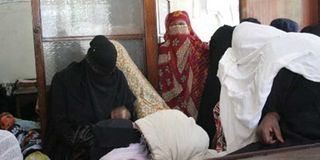'Slaves' in the Gulf: Women lured to Middle East

Rights groups also regularly denounce abuse and even torture of impoverished women from Bangladesh, Indonesia, Sri Lanka, the Philippines and Nepal who work as maids in Gulf countries. Typically, recruitment agencies enlist women from poorer countries and take a cut of their pay. PHOTO/FILE
What you need to know:
- But the problem reaches up to the corridors of power, and people within his own ministry are implicated or even own such recruitment agencies, Ramanitriniony acknowledged.
- Typically, recruitment agencies enlist women from poorer countries and take a cut of their pay.
- Every week, up to 30 maids return to Madagascar, some without any luggage. Many arrive after spending time in prison, because they are arrested after fleeing the homes where they work, according to social workers' union SPDTS.
ANTANANARIVO,
Malagasy mother Solange left the island in 2013 eager to work as a domestic servant in Saudi Arabia and earn a better living for her family. Less than a year later she was dead, her body flown home to a husband asking questions about her slave-like work conditions in the Middle East.
"During our last phone call she said 'I don't know where I am, nor the address. Soon I won't be with you anymore, take care of our two children,' " Herinirina told AFP while waiting for his wife's remains to arrive at the Antananarivo airport.
Her death was attributed to a heart attack and "the will of God", according to Saudi authorities, said Herinirina, who did not want his family name published.
His 34-year-old wife was one of many women from Madagascar who face horrific working conditions while earning a pittance, having travelled to the Middle East through recruitment agencies.
"They treated me like a slave, like a dog. My boss told me: 'You domestic workers are rubbish to us,'" said 20-year-old Annick, who escaped Kuwait to return home.
"My boss threw Clorox (a household product) and acid in my eyes," said Zitale Nirina, 39.
"I told his wife that I needed to go to hospital, but she wouldn't let me and told me to work whether I liked it or not, sick or not," Nirina told AFP.
"I started work at 6:00 am, had lunch at 3:00 pm and went to bed only at 2:00 am."
HUMAN TRAFFICKING
The abuse is not limited to women from the Indian Ocean island.
"Madagascar is one example among others in Africa," said International Labour Organisation (ILO) spokesman Hans von Rohland from Geneva.
"A recent ILO report on Ethiopia showed a lot of trafficking of Ethiopians to the Middle East and Sudan."
Rights groups also regularly denounce abuse and even torture of impoverished women from Bangladesh, Indonesia, Sri Lanka, the Philippines and Nepal who work as maids in Gulf countries.
Typically, recruitment agencies enlist women from poorer countries and take a cut of their pay.
The system has been operating for about 15 years in Madagascar, but the government decided last year to block sending its women to "risk countries".
Out of 52 recruitment agencies AFP contacted, 21 have closed down, but eight still offer work opportunities in blacklisted countries.
One agent who proposes work trips to Lebanon told AFP "the bosses are kind".
The country's labour ministry says international trafficking networks are keeping up the practise.
"An agency here in Madagascar is in contact with another one, say, in Saudi Arabia. Then the two divide the profits," said the ministry's director-general Samuelson Ramanitriniony.
"It's human trafficking pure and simple."
WILLING APPLICANTS
But the problem reaches up to the corridors of power, and people within his own ministry are implicated or even own such recruitment agencies, Ramanitriniony acknowledged.
With nine out of 10 Malagasies living under the poverty line, the trade finds many willing applicants.
Every week, up to 30 maids return to Madagascar, some without any luggage. Many arrive after spending time in prison, because they are arrested after fleeing the homes where they work, according to social workers' union SPDTS.
The group estimates that at least 35 women have died, though no official figure exists.
A family in the Gulf pays out about Sh300,000 ($3,400) to hire a maid, though some of these employees receive as little as $200 a month, said SPDTS's Norotiana Jeannoda.
The ILO believes families save around Sh700 billion ($8 billion) a year by cheating their maids out of their salaries.
"We estimate that the domestic workers who do forced labour get on average 40 per cent of the salary owed to them," said the ILO's Rohland.
Saudi Arabia last year passed new rules that grant maids one day rest a week and guarantee the payment of their salaries.





